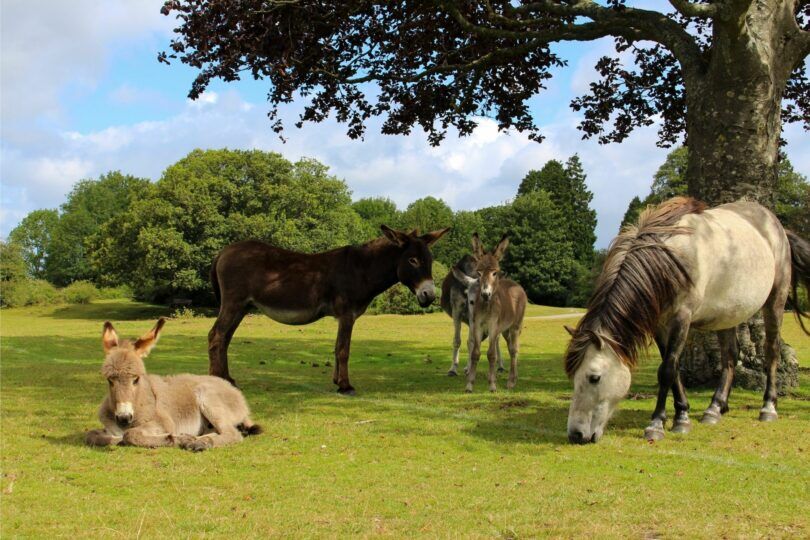Can donkeys live with horses… in harmony?
Donkeys are frequently thought of as companion animals for horses. But is that what’s best? Understanding the similarities and differences between horses and donkeys can help you decide if a donkey may fit in your lifestyle.
Donkeys and horses can make great companions, if you take the right precautions. Understand what they have in common and how to mitigate their differences for a happy herd.
Horses and Donkeys: Similarities and Differences
Donkeys and horses are both members of the equus sub-family. Where they differ is at the species level—horses, mules, donkeys, (and zebras!) are each their own, different species.
Since horses and donkeys are both equines, they do share many similarities—they are both monogastric, single-hoofed animals that evolved to graze on vegetation.
- Both are herbivores and do best when fed small meals throughout the day for optimal gut health
- Require routine hoof care
- Similar behavior—for example, both are herd animals and need to be with other equines for companionship
Not so fast…
Despite all these similarities, horses and donkeys are two different species and their needs vary.
- Horses evolved to graze on grasses, while donkeys evolved to browse on a larger variety of plant matter, including woody shrubberies.
- The donkey digestive system is much more efficient than that of the horse, making domestic donkeys prone to obesity
- The angles of donkey hooves differ from that of horses, so you’ll need to find a farrier that understands this and can trim accordingly
- Regarding behavior, horses are “flight” animals and run away from danger. Donkeys are “fight” animals and will generally stand their ground and face the danger, using hooves and teeth to defend themselves
Why do people think donkeys and horses cannot live together?
Donkeys are tolerant to a certain type of lungworm, Dictyocaulus arnfieldi, which is harmful to horses. Cross-infection is a concern, but can be easily mitigated with testing and worming.
The best method is to test the donkey’s fecal matter for the parasite before introducing new donkeys to an existing herd.
Consult your veterinarian to help create the proper testing program for your specific herd and geographic region.
Social Hierarchy
Both donkeys and horses follow complex social hierarchies; fortunately, they are quite similar. Once a herd establishes who is in charge, they can usually coexist peacefully. Some donkey and horse pairs can form very close bonds with each other.
Always introduce new animals slowly and with supervision, to keep everyone safe!
The best method to introduce new equines is to utilize separate paddocks that share a fence line. If you have the time and space, a couple days of over-the-fence acclimation is ideal.
If everyone seems to be getting along fine, supervised turnout together would be the next step.
What should you know before adding a donkey to your horse herd?
Donkeys are not horses—while they are similar, they do have different needs, such as nutrition and shelter. Donkeys have more efficient digestive systems than horses and, if fed the same, can easily become overweight.
We have an excellent resource on donkey nutrition here!
Donkeys are also less waterproof than horses. As desert-dwelling equines, they don’t need the waterproof oil that horses produce, covering individual hairs for an overall water-resistant coat.
Because of this, they are more likely to get chilled in inclement weather. Make sure you have adequate shelter available and consider blanketing if your climate and weather conditions warrant it.
Frequently Asked Questions
Q: Can donkeys live with other livestock?
Yes, donkeys can live with a variety of livestock, including cattle, goats, sheep, pigs, llamas, alpacas, and more. Donkeys can actually make good livestock guardians, as they will defend their territory against coyotes and other predators.
While donkeys and other livestock can live together peacefully, it doesn’t always mean they will—be sure you have plenty of space and resources before adding to your herd and always introduce new animals slowly, monitor interactions, and separate if needed.
It should be noted that the best companion for a donkey is always another donkey!
Q: What animals make the best companions for donkeys?
The best companion for a donkey is always another donkey, but donkeys can get along with a variety of other animals, including horses and mules.
Q: Is it cheaper to get a donkey or another horse as a horse companion?
Many people will opt to get a donkey instead of a second horse as a companion animal because donkeys are generally less expensive to feed and maintain.
Parting Thoughts
Donkeys and horses share enough similarities to peacefully cohabitate and can even form strong bonds. With some simple tweaks to your current horse management plan you can easily add a donkey (preferably two!) to your barn.
P.S. Enjoy this article? Trot on over to:
- How to Adopt a Wild Donkey: A Helpful Beginner’s Guide
- 5 Simple Steps to Halter Training Your Wild Donkey
- Safety First: How Much Can a Donkey Carry?
- 13 Best Treats and Toys for Busy-Minded Donkeys
- 5 Simple Tips to Help An Abused Horse
- Dangerous Horse: The Result of Being Abused
- Why horses are dangerous (but worth the risk!)
- 3 Fear-Free Secrets to Gain Your Horse’s Trust & Respect
- Bonding 101: How to Make the Most of Your Horse Time
Sources:
https://www.fei.org/stories/lifestyle/health-fitness/safety-horses-live-donkeys
https://practicalhorsemanmag.com/lifestyle/are-donkeys-good-companions-for-horses-32080
https://opensanctuary.org/article/how-donkeys-get-along-with-other-species/
https://equinewellnessmagazine.com/donkey-equine-herd/
